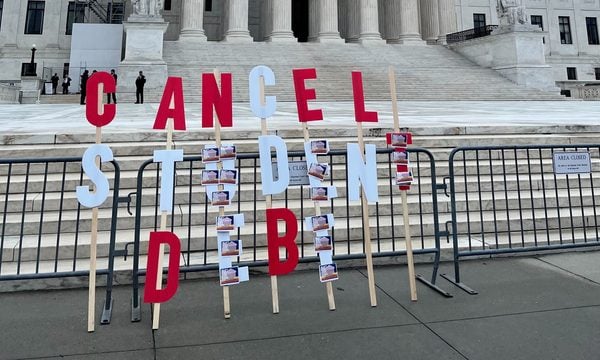14 Student Loan Forgiveness Programs for 2025: Do You Qualify?
The Education Department has forgiven billions of dollars in student loans through existing programs. If you have federal debt and meet certain requirements, you may qualify.

Many, or all, of the products featured on this page are from our advertising partners who compensate us when you take certain actions on our website or click to take an action on their website. However, this does not influence our evaluations. Our opinions are our own. Here is a list of our partners and here's how we make money.
Student loan forgiveness programs can erase some or all of your higher-ed debt. There are more than a dozen programs available, some of which have niche requirements, like working for a specific type of employer. Others, like income-driven repayment plans, are open to most borrowers with federal student loans.
Below are 14 programs, including student loan forgiveness, repayment assistance and discharge programs available in 2025. Check their requirements — plus other paths to relief.
Advertisement



Student loans from our partners

on SoFi® website
SoFi® 

Fixed APR
4.24-9.99%
Min. credit score
650
on Earnest website
Earnest 
Fixed APR
4.20-9.99%
Min. credit score
665

on College Ave website
College Ave 

Fixed APR
6.99-13.99%
Min. credit score
Mid-600s
Federal student loan forgiveness programs
The U.S. government offers forgiveness options for federal student loan borrowers. These programs typically target borrowers with lower incomes, large amounts of debt or public service jobs.
1. Income-driven repayment forgiveness
The federal government offers several income-driven repayment (IDR) plans, which typically allow you to cap your loan payments at a percentage of your monthly discretionary income. Payments can be as low as $0 per month.
When enrolled in one of these plans, your remaining loan balance may be eligible for forgiveness in 20 or 25 years, depending on the plan and the type of student loans you have.
These plans are most beneficial for those with large loan balances relative to their income. This forgiveness was made tax-free at the federal level through the end of 2025, as part of the 2021 American Rescue Plan.
Note that Donald Trump’s “one big, beautiful bill,” proposes a new income-based Repayment Assistance Plan (RAP) that uses gross income, rather than discretionary income, to calculate payments and offers forgiveness after 30 years.
How to get IDR forgiveness: Apply online at StudentAid.gov/IDR, or contact your student loan servicer for personalized guidance.
2. Public Service Loan Forgiveness
Public Service Loan Forgiveness (PSLF) is available to government and qualifying nonprofit employees with federal student loans. Eligible borrowers can have their remaining loan balance forgiven tax-free after making 120 qualifying loan payments on an IDR plan and 10 years of full-time public service work.
While a recent executive order from the Trump administration proposed changes to PSLF, the program is currently operating as usual.
How to get PSLF forgiveness: Use the government’s PSLF Help Tool to see if you qualify.
3. Teacher Loan Forgiveness
Teachers employed full time in low-income public schools may be eligible for Teacher Loan Forgiveness after working for five consecutive years. They can have up to $17,500 in federal direct or Stafford loans forgiven. To qualify, teachers must have taken out loans after Oct. 1, 1998.
Teachers can also qualify for PSLF or Perkins loan cancellation.
How to get Teacher Loan Forgiveness: Submit a Teacher Loan Forgiveness Application to your loan servicer.
4. Student loan forgiveness for nurses
Nurses have several student loan forgiveness options: PSLF, Perkins loan cancellation and the NURSE Corps Loan Repayment Program, which pays up to 85% of qualified nurses’ unpaid college debt.
However, PSLF may be the most likely option for most nurses — few borrowers have Perkins loans, and the NURSE Corps program is highly competitive.
Student loan discharge programs
Student loan discharge programs are available to students in extreme situations, like those whose school defrauded them or who cannot work due to a permanent disability. These programs are designed to protect borrowers.
Student loan discharge differs from forgiveness because you can typically get a refund for past payments. Forgiveness only erases any remaining debt at the time you qualify for the program.
5. Closed school discharge
You may qualify for a closed school loan discharge if your school closes. At the time of closure, you must have been enrolled or have left within 180 days, without receiving a degree.
If you qualify, contact your student loan servicer to start the application process. You’ll need to continue making payments on your loan while your application is being processed. If you’re approved, you will no longer have to make loan payments and you may be refunded some or all of the past payments you made on the loan.
6. Borrower defense to repayment
Borrowers defrauded by their colleges may qualify for debt relief under the borrower defense to repayment program. You’ll need to file a borrower defense claim with the U.S. Department of Education. If you qualify, you may have your loans automatically discharged, at the discretion of the Education Department.
While borrowers may apply for borrower defense relief and closed school discharge, the Department of Education is not currently making decisions on relief approvals until an active federal court injunction is resolved.
7. Perkins loan cancellation and discharge
Borrowers with federal Perkins loans can have up to 100% of their loans canceled if they work in a public service job for five years. In many cases, approved borrowers will see a percentage of their loans discharged incrementally for each year worked.
This program also has a loan discharge benefit for teachers who work full time in a low-income public school or who teach qualifying subjects, such as special education, math, science or a foreign language.
8. Total and permanent disability discharge
If you cannot work due to being totally and permanently disabled, physically or mentally, you may qualify to have your remaining student loan debt canceled.
To be eligible for a total and permanent disability student loan discharge, you’ll need to provide documentation proving your disability. Once your loans are discharged, the government may monitor your finances and disability for three years. If you don’t meet requirements during the monitoring period, your loans may be reinstated.
9. Total and permanent disability discharge for veterans
Veterans who are totally and permanently disabled will have their student loan debt discharged. The process will be automatic unless they decline due to potential state tax liability.
10. Student loan death discharge
If you die, your federal loans will be discharged once a death certificate is submitted to your loan servicer by a family member or authorized representative. Federal parent PLUS loans can be discharged upon the death of either the parent who took out the loan or the student for which they borrowed.
Student loan repayment assistance programs
The federal government isn’t the only student loan forgiveness provider. Some states, organizations and companies may help you pay off your student loan bills — particularly if you work in certain high-need industries, like healthcare or education.
These programs are typically framed as “student loan repayment assistance,” rather than forgiveness, because they pay you or your servicer directly, rather than erasing your debt at the source.
Some of these programs may also apply to private student loans, in addition to federal loans.
11. State-sponsored student loan repayment assistance programs
Licensed teachers, nurses, doctors and lawyers in certain states may be able to take advantage of state programs to assist with repaying debt. For example, Mississippi's Winter-Reed Teacher Loan Repayment Program will pay up to $6,000 per year on undergraduate educational loans to teachers with a specific teaching license for each year of teaching full time in a particular geographical or subject area.
Contact your state’s higher education department to find out if you qualify for a program and check with your professional associations. For example, the American Bar Association has a list of state loan repayment programs for lawyers.
In some cases, local or state governments may also offer student loan help if you simply move to the area or buy property.
12. Military student loan forgiveness and assistance
U.S. military personnel and veterans in the Army, Navy, Air Force, National Guard and Coast Guard may qualify for their own loan forgiveness programs. In the National Guard, for example, qualifying soldiers and officers could receive up to $50,000 to pay off federal student loans.
13. Organizational student loan repayment assistance
Some national organizations offer student loan repayment assistance. The National Institutes of Health, for example, offers up to $50,000 in debt assistance annually to health professionals who are appointed by the institutes to conduct research.
14. Employer-sponsored student loan repayment assistance
Your employer may offer student loan repayment assistance as part of your benefits package. Programs vary, but most put money directly toward your student loans each month over a certain number of years, or up to a lifetime maximum.
Can you get private student loan forgiveness?
Most forgiveness options are only available to borrowers with federal student loans. Private student loan forgiveness is uncommon and typically only happens if the borrower dies or becomes permanently disabled.
You may have other private student loan relief options, like temporarily deferring payments. To learn about relief available to you, reach out to your lender and refer to the origination document you signed when you first took out the loan.
The caveats of student loan forgiveness
Legitimate federal forgiveness, cancellation and discharge programs are free, but there are other costs to consider.
- Beware of scams. So-called debt relief companies claim to get rid of debt but rarely deliver after charging already-struggling borrowers high upfront fees. The only way to get debt discharged is through the legitimate programs above, and it costs nothing to apply to them.
- Forgiveness isn’t an option for defaulted loans. You’ll need to use consolidation or rehabilitation to get defaulted federal student loans in good standing before they’re eligible for forgiveness. If your loans won’t qualify for forgiveness, student loan settlement or bankruptcy may reduce your debt in severe cases.
- You could face an unexpected tax bill. Some types of student loan forgiveness may be taxable as extra income at the federal or state level, which could leave you with a larger-than-expected tax bill. Check the fine print of your forgiveness program and reach out to your state’s tax office for more information.
» MORE: How to avoid student loan scams
Alternatives to student loan forgiveness
If you’re struggling to repay your student loans, forgiveness isn’t the only route to relief. Explore these other options to lower your monthly payments.
- Income-driven repayment plans. Even if you won’t qualify for forgiveness under an IDR plan, you could still get lower monthly payments as you pay off your debt. Use the government’s loan simulator to compare your bills on different repayment plans.
- Deferment or forbearance. You can temporarily pause your student loan bills by asking your servicer for a deferment or forbearance. Interest may still build on your debt, though, increasing the overall amount you’ll owe.
- Student loan refinancing. Refinancing your student loans with a private lender can get you a lower interest rate, reducing your monthly bill and the amount you pay overall. If you have federal loans, this isn’t usually a good option because you’ll forfeit access to government forgiveness programs. But if you already have private loans, consider refinancing if you can get a lower rate.
- Federal consolidation. If you consolidate your federal loans with the government, you’ll stay in the federal student loan system. It allows you to extend your repayment term to up to 30 years. This can lower your monthly bill, though it may increase the amount you pay over time.
Article sources
NerdWallet writers are subject matter authorities who use primary,
trustworthy sources to inform their work, including peer-reviewed
studies, government websites, academic research and interviews with
industry experts. All content is fact-checked for accuracy, timeliness
and relevance. You can learn more about NerdWallet's high
standards for journalism by reading our
editorial guidelines.
Related articles
AD
Refinance Your Student Loans with Earnest: smarter rates, total flexibility, no fees.
Check rate
on Earnest's website

AD

Refinance Your Student Loans with Earnest: smarter rates, total flexibility, no fees.
- Fixed APRs starting at 4.20%, Variable Rates starting at 5.88%;
- Customize your term down to the month (5–20 years);
- Skip one payment every 12 months.
Check rate
on Earnest's website








